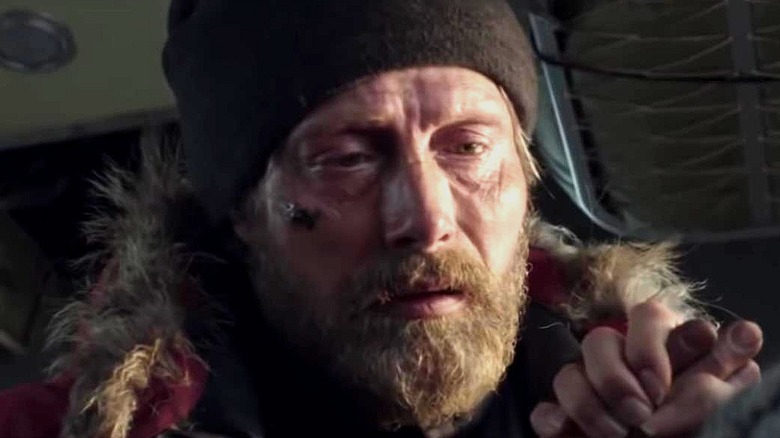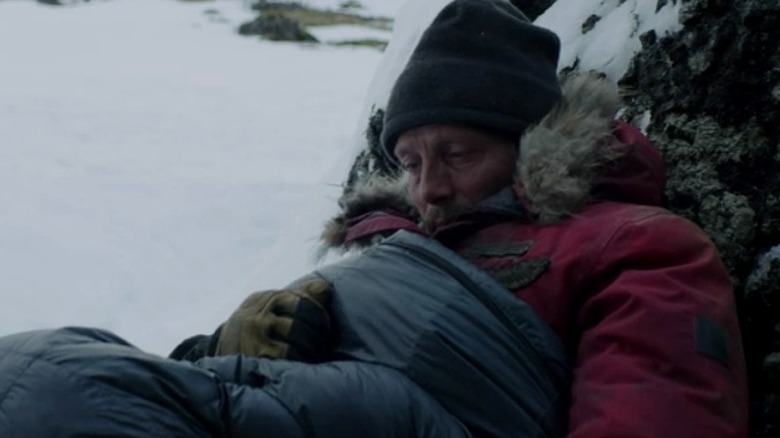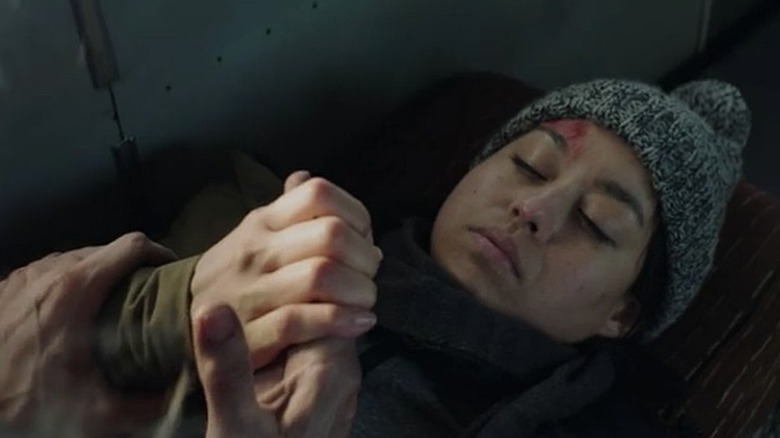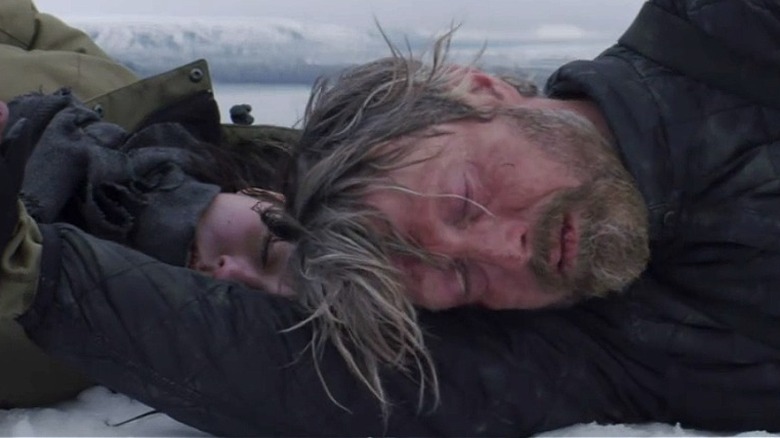The Ending Of Arctic Explained
The relatively straight-forward IMDb synopsis of Joe Penna and Ryan Morrison's "Arctic" belies its simultaneously gut-wrenching and uplifting exploration of some of the most fundamental questions about humanity and human nature. "A man stranded in the Arctic after a plane crash," the logline reads, "must decide whether to remain in the relative safety of his makeshift camp or to embark on a deadly trek through the unknown."
In reality, this decision kicks-off the action in "Arctic," but is made relatively early-on in the film. Said "man" — a downed but well-prepared pilot named Overgård, portrayed with glaring emotional realism by Mads Mikkelsen — decides to embark on the treacherous journey in order to bring a gravely injured young woman (Maria Thelma Smáradóttir) to a seasonal station his map puts at just a few days' journey away. The Young Woman, as she's credited, is part of a two-man rescue team whose helicopter crashes in their attempt to save Overgård, killing the pilot and leaving Smáradóttir's character on the edge of death. Overgård brings the woman back to his makeshift-but-well-fortified camp, but when it becomes clear that she'll die without proper medical treatment, he resolves to care for and relocate her, despite knowing that the best decision for his own survival would be to stay put.
It's a simple narrative with an extremely small cast of characters (just the two), but its nearly silent unfurling touches on some of the more complex themes and questions at the heart of what it means to be human. In other words, it's not your average, one-dimensional man-versus-nature survival story.
Mads Mikkelsen's character is a blank slate for the viewer
Importantly, "Arctic" trusts its audience, and refuses to fall into the trap of explaining its characters' thoughts and motivations via soap opera-esque soliloquies, close-ups of newspaper clippings, or extended speeches into a tape recorder. In fact, the vast majority of the film contains no dialog at all, which all but forces the viewer to superimpose their own instinctual and emotional responses onto the blank slate that is Overgård — a man whom we know almost nothing about outside of his immediate situation. The old thematic trope that man is powerless in the face of "the awesome power of nature" isn't what drives the film, whose plot presupposes, accepts, and repeatedly demonstrates that reality without making it the focus.
Instead, by forcing the viewer to interpret what the protagonist is thinking or what it is that motivates him to persevere, "Arctic" is able to explore some less obvious territory. One wonders, for instance, if Overgård is driven to risk his life to save a total stranger because such an impulse is inherent in the emotional make-up of mankind, or if its his own (perhaps equally inherent) guilt over being the cause of her unfortunate circumstances that compels him. What's clear is this: when faced with the option of surviving in total isolation or potentially dying alongside a fellow human being, Overgård opts for the latter.
Arctic explores the importance of human connection
Twice, when The Young Woman appears on the verge of breathing her last breath — and when Mikkelsen's alternately resolute and hopeless character is at his lowest point — he grasps the woman's hand and repeatedly assures her, "It's okay ... you're not alone." The film's repeated focus on "aloneness" being a fate worse than death suggests its thesis has less to do with mankind's steadfast will to live and everything to do with what defines "mankind." In his darkest hour, Overgård takes comfort not in the thin shred of hope that he and the young woman might live, but that, at the very least, they won't die alone.
Throughout the movie, Overgård gauges his companion's awareness by asking her to squeeze his hand. While this is a common medical technique for testing an individual's motor skills and level of consciousness, the pilot's repeated use of it, the camera's repeated zooming-in on it, and The Young Woman's wavering ability to actually grasp Overgård's hand, are Penna's way of reiterating that for humans, grasping to life means being able to grasp onto someone else. When she can no longer grasp his hand with any discernible conviction or force, Overgård wraps the woman's hand around a photo of her family he found in her helicopter.
Arctic's ambiguous ending reiterates its real focus
Although the pilot and his near-death counterpart do ultimately make it to the seasonal station (after nearly being consumed by the landscape, the weather, and a polar bear) their rescue is never actually shown. Overgård tries desperately to signal a helicopter within the pair's line of sight, only to see it take off, he believes, toward the camp from whence they've originally come. The film ends with a defeated but accepting Overgård laying down next to his unconscious charge, and again whispering "It's okay, you're not alone. It's okay..." while clutching her hand in his as his eyes close. In the background, a helicopter finally rises over the mountain peaks and begins making its way to their bodies. But what could have been a trite, "isn't it ironic?" ending is elevated by the ambiguity surrounding the final scene.
Whatever histories, societal constructs, or personality traits might have defined these individuals prior to their meeting falls away, and the viewer is left to fill in the blanks. We don't know if the two are dead or alive, nor what their interaction might be following their potential rescue. That's because the film isn't interested in "two humans defying the odds" so much as it is in examining what it means to be "two humans" — bonded in their struggle, removed from the influences of society, and defined only by their most immediate, physical surroundings and circumstances.



